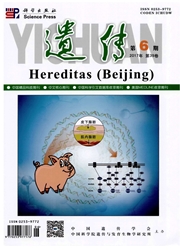

 中文摘要:
中文摘要:
基因组印记是指后代仅表达亲本之一基因拷贝的现象。印记基因的发生是防止孤雌生殖发生的有效手段之一。拟南芥FIS(Fertilisation—independent seed)印记基因mea、fis2和fie在中央细胞分裂抑制和早期胚乳发育调节中发挥重要作用。fis突变体具有两种表型:当受精缺失时二倍体胚乳自主发育,而当受精发生时形成非细胞化的胚乳。FIS多梳蛋白复合体(Polycomb protein complex)包括上述3种FIS蛋白,在目标位点催化组蛋白H3第27位赖氨酸的tri-甲基化(H3K27 tri—methylation)。DME(DEMETER)和AtMETI(Methyltransferasel)参与了mea和fis2的印记表达控制。最近研究结果表明,开花植物中转座子的插入影响邻近基因的表达,是基因组印记进化的主要驱动力量。本文综述了10年来拟南芥中FIS印记基因和相关基因的发现及其调控机理,期望能为水稻、玉米等重要作物中印记基因的研究提供借鉴和参考。
 英文摘要:
英文摘要:
Genomic imprinting refers to the phenomenon that the expression of a gene copy depends on its parent of origin. The Arabidopsis imprinted FIS(Fertilisation-independent seed) genes, mea, fis2, and fie, play essential roles in the repression of central cell and the regulation of early endosperm development, fis mutants display two phenotypes: autonomous diploid endosperm development when fertilization is absent and un-cellularised endosperm formation when fertilization occurs. The FIS Polycomb protein complex including the above three FIS proteins catalyzes histone H3 K27 tri-methylation on target loci. DME(DEMETER), a DNA glycosylase, and AtMET1 (Methyltransferasel), a DNA methyltransferase, are involved in the regulation of imprinted expression of both mea andfis2. This review summarizes the studies on the Arabidopsis imprinted FIS genes and other related genes. Recent works have shown that the insertion of transposons may affect nearby gene expression, which may be the main driving force behind the evolution of genomic imprinting. This summary covers the achievements on Arabidopsis imprinted genes will provide important information for studies on genomic imprinting in the important crops such as rice and maize.
 同期刊论文项目
同期刊论文项目
 同项目期刊论文
同项目期刊论文
 The microarray analysis for gene expression in haploids and diploids derived from twin-seedling rice
The microarray analysis for gene expression in haploids and diploids derived from twin-seedling rice 期刊信息
期刊信息
